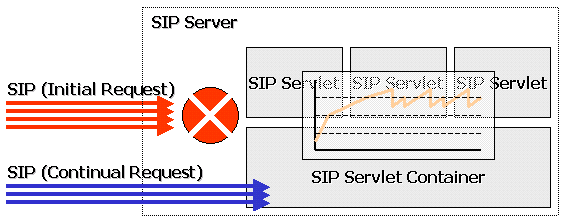| SIP Servlet Engine© Documentations |
| Top > System Administration > Configuration > SIP Server --> Configuration --> Regulations |
SIP Server --> Configuration --> Regulations
Overview
Use the SIP Server --> Configuration --> Regulations tab to define how the SIP server regulates incoming SIP messages when burst traffic occurred. For more information about incoming-call regulation, see Blockage Function.

SIP Servlet Engine use the incoming-call regulation function to selectively regulate only the initial requests among the SIP messages received when burst traffic occurred, so as to suppress their influence to the operation of the application as much as possible. You can specify the session generation rate or length of the execute queue as the trigger for this regulation.
The regulated SIP request is not transmitted to the application and is destroyed with the return of “503 Service Busy” response.
Attribute
| Attribute Label | Description | Value Constraints |
|---|---|---|
| Type of Regulated Object | The resource to be monitored as the trigger for the incoming-call regulation. MBean: CallRegulateManagerMBean Attribute: RegulateType |
"None", "Session Generation Rate", "Execute Queue Length" |
| Session Count that Triggers Regulation | When the number of sessions generated per second exceeds this value, the incoming-call regulation function that refuses to receive new SIP requests becomes enabled. MBean: CallRegulateManagerMBean Attribute: Threshold |
Minimum: 0 Maximum: 100 |
| Session Count that Terminates Regulation | When the number of sessions generated per second falls below this value, the incoming-call regulation function that refuses to receive new SIP requests becomes disabled. This value should be smaller than the Session Count that Triggers Regulation. MBean: CallRegulateManagerMBean Attribute: ReleaseValue |
Minimum: 0 Maximum: 100 |
| Queue Length that Triggers Regulation | When the number of unprocessed requests in the execute queue exceeds this value, the incoming-call regulation function that refuses to receive new SIP requests becomes enabled. The maximum value is the execute queue length (default: 65535). MBean: CallRegulateManagerMBean Attribute: Threshold |
Minimum: 0 Maximum: 65535 |
| Queue Length that Terminates Regulation | When the number of unprocessed requests in the execute queue falls below this value, the incoming-call regulation function that refuses to receive new SIP requests becomes disabled. This value should be smaller than the Queue Length that Triggers Regulation. The maximum value is the execute queue length (default: 65535). MBean: CallRegulateManagerMBean Attribute: ReleaseValue |
Minimum: 0 Maximum: 65535 |
Back to Administration Console
Last Modified:Wed Jan 12 18:28:47 JST 2005
| Copyright © 2003, 2004 Oki Electric Industry Co.,Ltd. All rights reserved. |